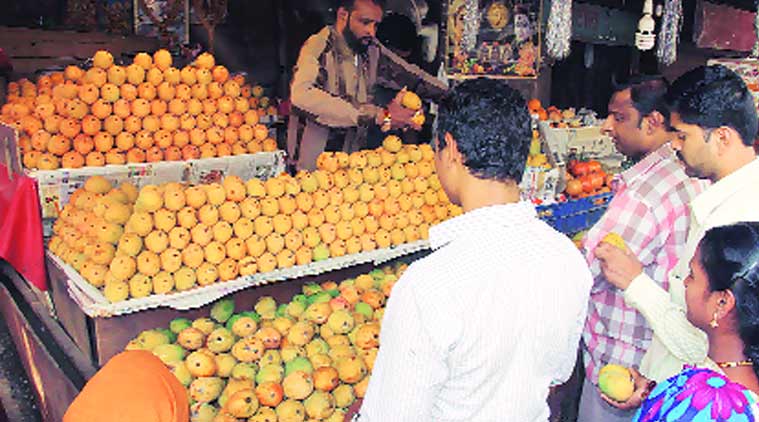 FDA has banned use of calcium carbide to hasten the process of ripening of mangoes.
FDA has banned use of calcium carbide to hasten the process of ripening of mangoes.Ahead of another mango season, the Pune fruit market is staring at a likely loss. Traders and farmers have not forgotten last year’s Food and Drug Administration (FDA) raids that destroyed lakhs of mangoes for using calcium carbide to hasten the ripening process. They said a ripening chamber approved by the FDA was not available to them.
FDA had banned calcium carbide that traders used for hastening the process of ripening of mangoes. FDA authorities pointed out that the chemical was detrimental to health. The FDA says consumption of mangoes ripened by using calcium carbide can lead to upset stomach, accumulation of fluids in lungs, ulcers and sores etc. Acetylene, the actual ripening agent produced from calcium carbide, is believed to be carcinogenic. The FDA had thus banned calcium carbide and launched a massive crackdown across APMCs in the state to destroy mangoes that were ripened using the chemical.

FDA destroyed more than 23,678 kg mangoes, worth more than Rs 11.28 lakh in May last year. In Pune, more than 5 lakh mangoes were destroyed.
Story continues below this ad
Following the FDA crackdown, APMC had set up a temporary ripening chamber near the present flower market at Marketyard. It had a capacity of ripening 35 tonne mangoes. Instead of acetylene, the chamber used ethylene for ripening of mangoes. It was approved by FDA. However, the chamber was destroyed later for expansion of the flower market.
Rohan Ursal, a trader with the Pune market, said that till now no effort has been made by APMC or the director marketing to solve the issue. “Without ripening chamber we are not sure how we will ripen the mangoes. Fear of action by the FDA will prevent traders from buying from farmers as most of us do not have facility to store mangoes,” he said.
Mangoes ripening in the natural way would take the same time, usually three months, using ethylene, an organic compound it produces. Artificial ripening using extra ethylene is to speed up the process so that arrival of mangoes in the market can be staggered. Otherwise all of them would arrive around the same time creating a glut, and a loss.
Ursal said that during peak season, APMC Pune sees arrival of 35-45,000 boxes of mangoes mainly from Maharashtra and Karnataka. Last year, the sudden crackdown on carbide ripened mangoes sent prices plummeting by 50 per cent.”After Vashi APMC, Pune market has the largest inflow of mangoes and without any ripening chamber this year the mango season would see disruptions,” he said.
Story continues below this ad
Dhananjay Dhoipode, chief administrator of APMC, confirmed that the ripening chamber has been destroyed and there is no ripening chamber with the APMC now. “We do not have any plans to get another ripening chamber as of now,” he said.

 FDA has banned use of calcium carbide to hasten the process of ripening of mangoes.
FDA has banned use of calcium carbide to hasten the process of ripening of mangoes.






